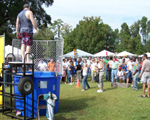Organ transplant recipients, donors
celebrate life
by Mary Helen Yarborough
Public Relations
More than 1,000 organ transplant recipients, donors, their families and friends participated in the annual Celebrate Life picnic sponsored by the MUSC Transplant Center on Oct. 21.
The celebration, at the West Ashley Elks Lodge, featured plenty of food, games, music and praise. Participants shared in the spirit of appreciation for medical transplant services, second chances and priceless generosity.
 Dr. Kenneth Chavin,
professor of surgery, College of Medicine, gets dunked during the
Celebrate Life fair. The dunking booth raised $400.
Dr. Kenneth Chavin,
professor of surgery, College of Medicine, gets dunked during the
Celebrate Life fair. The dunking booth raised $400.A steady flow of now-healthy patients chatted with their MUSC doctors updating them on their improved lives and expressing gratitude for the care and service at MUSC.
MUSC’s transplant program, which began with its first kidney transplant in 1968, is one of the most established in the nation. Since that time, 3,000 kidneys have been transplanted at MUSC. The liver program began in 1984, and since then, 600 livers have been transplanted. Since 1987, when the first heart transplant was performed here, 500 hearts have pumped new life in donor recipients at MUSC.
Patients that would have died long ago are alive today because of these and other major organs, bone marrow and tissue transplants performed at MUSC.
As the program continues to excel and expand, it also is setting the pace for transplant centers nationally.
“MUSC has the only hospital in the nation that can get kidney transplant patients in and out in three days,” said Amy Marfia, R.N., MUSC kidney transplant coordinator. “We were able to achieve this by redeveloping the pathways about a year- and-a-half ago. We currently are working on developing a pathway for the liver.”
 Robert Watson of
Hopkins, left, updates Dr. Prabhakar Baliga on the new kidney he
received Sept. 6.
Robert Watson of
Hopkins, left, updates Dr. Prabhakar Baliga on the new kidney he
received Sept. 6.That revised pathway includes a comprehensive, clearly understood patient education program that enables transplant recipients and their caregivers to leave the hospital sooner and well-equipped to manage their health and lives.
By cutting the length of stay, the expense of providing organ transplants also is cut, which means the hospital may be able to perform more of them.
Several insurance companies also are working to try and minimize the hospital costs of an organ transplant, said Prabhakar Baliga, M.D., medical director and chief of MUSC transplant surgery.
The cost of an organ transplant can range from $50,000 to $500,000, depending on the organ, procedure and complications. Blue Cross/Blue Shield of South Carolina, for example, may pay up to 65 percent depending on the contract.
Then, after receiving a new organ, anti-rejection drugs and other therapies needed to fight infections common among immuno-suppressant organ recipients can cost up to $15,000 a year.
“It’s tough unless you have insurance,” Baliga said. “And Medicare stops paying after three years.” Medicare may be renewed, however, based on the individual patient’s condition.
Meanwhile, Baliga said he does not understand insurance companies’ resistance to support more transplants over costly alternatives. “It costs $60,000 a year for someone to be on kidney dialysis, which is terrible for the patient,” he said. “A transplant is much cheaper and the patient can live well for many years.”
Patients suffering from fatal diseases and needing a transplant are relegated to a waiting list that often is longer than their lives can endure. Financial assistance through foundations, organizations and community support groups help defray the costs of medications and follow-up treatment.
Services such as LifePoint constantly monitor hospitals and other community resources for organ sources, and they work with coroners to help connect them with families to arrange timely organ harvesting from recently perished individuals.
Critical needs, growing list
As of late October, about 705 adult and pediatric patients in South Carolina were on a waiting list at MUSC to receive an organ transplant, according to Sara Stello, MUSC transplant administrative coordinator.
Overall, the organ in highest demand in South Carolina is the kidney where 632 are patients listed as waiting; followed by the liver (35), kidney/pancreas combination (26), heart (9), and pancreas alone (8). In addition, 46 patients also await bone marrow transplants. The majority of patients on the waiting list are black Americans.
Across America, an estimated 98,000 people are awaiting an organ transplants, and between January and July, 16,758 organ transplants were performed.
One donor can save the lives of eight people needing organs, and up to 100 more people through tissue donation. “The most important thing anyone can do is plan to be an organ and tissue donor by downloading a donor card from our site and, importantly, let their loved ones know of their desire to be a donor,” said Sue Poveromo, LifePoint spokeswoman. LifePoint only works with families of deceased donors, she added.
For more information, see http://www.lifepoint-sc.org or http://www.unos.org.
The Donor Tree Ceremony will be held Dec. 11 on the 9th floor of Rutledge Tower. This ceremony pays tribute to families who lost a loved one and saved another’s life by providing organs for transplant.
Friday, November 1, 2007
Catalyst Online is published weekly,
updated
as needed and improved from time to time by the MUSC Office of Public
Relations
for the faculty, employees and students of the Medical University of
South
Carolina. Catalyst Online editor, Kim Draughn, can be reached at
792-4107
or by email, catalyst@musc.edu. Editorial copy can be submitted to
Catalyst
Online and to The Catalyst in print by fax, 792-6723, or by email to
catalyst@musc.edu. To place an ad in The Catalyst hardcopy, call Island
Publications at 849-1778, ext. 201.